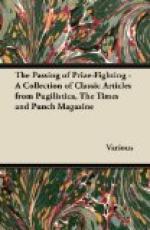When Rita Sismondi appears in an evil Futurist black-and-white gown by Viola you can tell at once she is the goods. But naturally Abe’s first thought is, “What will Rosie say?” His second, shared by Mawruss: “Hang Rosie! We shall both like this lady.” Finances are not flourishing, but the crooked manager of the very unbusinesslike bank that is financing the P. and P. Film Co. harbours designs on the virtue of Rita, who has this commodity in a measure unusual with film vampires (or usual, I forget which), and is just a slightly adventurous prude out for a good time. He accordingly advances more money for The Guilty Dollar on condition that Rita be engaged, and yet more money on condition that she be not fired by any machinations of jealous wives.
Rosie, indeed, says a good deal when she turns up at a rehearsal and finds the vampire clad in the third of a gown hazardously suspended on her gracious shoulders by bead straps, and Mawruss and Abe demonstrating how in their opinion the kissing scenes should be conducted so as to make a really notable production. However, the vampire’s film vices make the success of the company, and her private virtues bring all to a happy ending.
The story need hardly concern us. It is not plausible, which matters nothing at all. Mr. YORKE and Mr. LEONARD are the essential outfit, and it seems to me they are better than ever. One simply has to laugh, louder and oftener than is seemly for a self-respecting Englishman. No doubt their authors, Messrs. GLASS and GOODMAN, give them plenty of good things to say, but it is the astonishing finish and precision of their technique which make their work so pleasant to watch. If it throws into awkward relief the amateurishness of some of their associates that can’t be helped. Miss VERA GORDON’S Rosie is a good performance, and Miss JULIA BRUNS, the vampire, seemed to me to make with considerable skill and subtlety a real character (within the limits allowed by the farcical nature of the scheme) out of what might easily have been uninvitingly crude.
T.
* * * * *
OUR FRIEND THE FISH.
“What is a sardine?” was a question much before the Courts some few years ago, not unprofitably for certain gentlemen wearing silk, and the correct solution I never heard; but I can supply, from personal observation, one answer to the query, and that is, “An essential ingredient in London humour.” For without this small but sapid fish—whatever he may really be, whether denizen of the Sardinian sea, immature Cornish pilchard, or mere plebeian sprat well oiled—numbers of our fellow-men and fellow-women, with all the will in the world, might never raise a laugh. As it is, thanks to his habit of lying in excessive compression within his tin tabernacle, and the prevalence in these congested days of too many passengers on the Tubes, on the Underground and in the omnibuses, whoever would publicly remove gravity has but to set up the sardine comparison and be rewarded.




